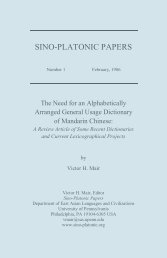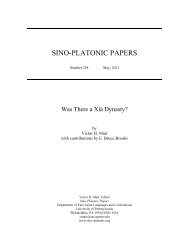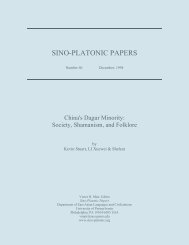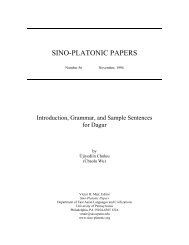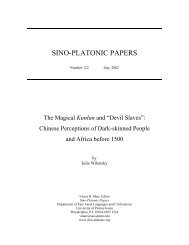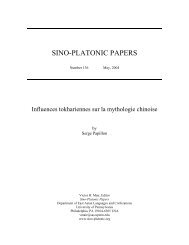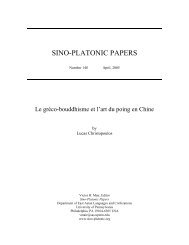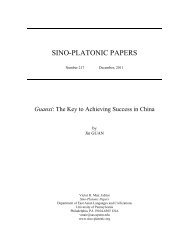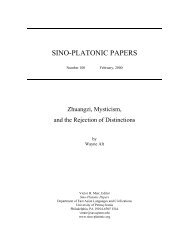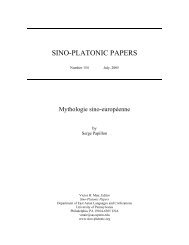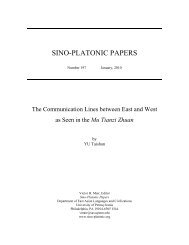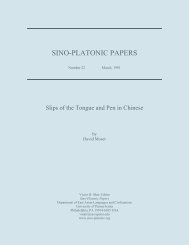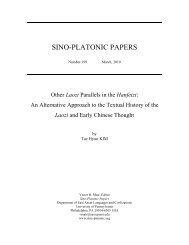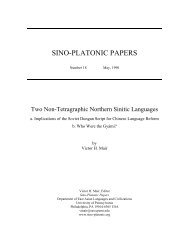Introduction and Notes for a Complete Translation of the Chuang Tzu
Introduction and Notes for a Complete Translation of the Chuang Tzu
Introduction and Notes for a Complete Translation of the Chuang Tzu
You also want an ePaper? Increase the reach of your titles
YUMPU automatically turns print PDFs into web optimized ePapers that Google loves.
Victor H. Mair, "<strong>Introduction</strong> <strong>and</strong> <strong>Notes</strong> <strong>for</strong> a <strong>Complete</strong> <strong>Translation</strong> <strong>of</strong> <strong>the</strong> <strong>Chuang</strong> <strong>Tzu</strong>"<br />
Sino-Platonic Papers, 48 (September, 1994)<br />
render into English. To prepare myself <strong>for</strong> <strong>the</strong> task, I ga<strong>the</strong>red toge<strong>the</strong>r scores <strong>of</strong><br />
traditional commentaries <strong>and</strong> modem exegeses. Although I have consulted <strong>the</strong>m closely<br />
<strong>and</strong> carefully during <strong>the</strong> course <strong>of</strong> my research, I seldom refer to <strong>the</strong>m directly in <strong>the</strong> notes<br />
to <strong>the</strong> translation. The main reason <strong>for</strong> this is that I view <strong>the</strong> <strong>Chuang</strong> <strong>Tzu</strong> primarily as a<br />
work <strong>of</strong> literature ra<strong>the</strong>r than as a work <strong>of</strong> philosophy <strong>and</strong> wish to present it to <strong>the</strong> reading<br />
public unencumbered by technical arcana that would distract from <strong>the</strong> pleasure <strong>of</strong><br />
encountering one <strong>of</strong> <strong>the</strong> most playful <strong>and</strong> witty books in <strong>the</strong> world.<br />
There have been a few previous translations <strong>of</strong> <strong>the</strong> <strong>Chuang</strong> <strong>Tzu</strong> into English,<br />
French, German, M<strong>and</strong>arin, Japanese, <strong>and</strong> o<strong>the</strong>r languages (including several complete<br />
ones) although nothing like <strong>the</strong> hundreds that have been done <strong>for</strong> <strong>the</strong> Tao Te Ching, that<br />
o<strong>the</strong>r well-known Taoist classic. Some <strong>of</strong> <strong>the</strong>se renditions are quite competent, but I<br />
believe that none <strong>of</strong> <strong>the</strong>m has succeeded in capturing <strong>the</strong> quintessential spirit <strong>of</strong> <strong>the</strong> book.<br />
Both <strong>the</strong> style <strong>and</strong> <strong>the</strong> thought <strong>of</strong> <strong>the</strong> <strong>Chuang</strong> Tnr are extraordinary. If we try to approach<br />
<strong>the</strong>m by conventional means, we will surely fail. There<strong>for</strong>e, in making my translation, I<br />
have not been afraid to experiment with new modes <strong>of</strong> expression to simulate <strong>the</strong> odd<br />
quality <strong>of</strong> writing in <strong>the</strong> <strong>Chuang</strong> <strong>Tzu</strong>. If my rendering has any o<strong>the</strong>r aim than philological<br />
accuracy, it is to present <strong>Chuang</strong> <strong>Tzu</strong> as a preeminent literary stylist <strong>and</strong> to rescue him from<br />
<strong>the</strong> clutches <strong>of</strong> those who would make <strong>of</strong> him no more than a waffling philosoph or a<br />
maudlin minister <strong>of</strong> <strong>the</strong> Taoist faith.<br />
Be<strong>for</strong>e proceeding fur<strong>the</strong>r, I should be kind enough to explain what <strong>the</strong> name <strong>of</strong> <strong>the</strong><br />
book means <strong>and</strong> how it should be pronounced. "<strong>Chuang</strong>" is <strong>the</strong> surname <strong>of</strong> <strong>the</strong> supposed<br />
author <strong>of</strong> this marvelous work <strong>and</strong> "<strong>Tzu</strong>" simply implies "master" in <strong>the</strong> sense <strong>of</strong> <strong>the</strong> leader<br />
<strong>of</strong> a given school <strong>of</strong> thought in ancient China. Hence, we may render "<strong>Chuang</strong> <strong>Tzu</strong>" as<br />
"Master <strong>Chuang</strong>." While <strong>the</strong> pronunciation <strong>of</strong> <strong>the</strong> title is not such an easy matter as its<br />
meaning, I would console my poor reader who is afraid to attempt it by saying that<br />
speakers <strong>of</strong> Sinitic languages <strong>the</strong>mselves have pronounced (<strong>and</strong> still do pronounce) <strong>the</strong> two<br />
sinographs used to write it in widely varying ways. For example, a Cantonese would read<br />
<strong>the</strong>m, more or less, as tshuhng tzyy <strong>and</strong> a resident <strong>of</strong> <strong>the</strong> Chinese capital 2,600 years ago<br />
would have pronounced <strong>the</strong>m roughly as tsyang tsyehg or tsryangh rsyehgh. There<strong>for</strong>e, it<br />
does not really matter that much how each <strong>of</strong> us says <strong>the</strong> title <strong>of</strong> <strong>the</strong> book in his or her own<br />
idiolect. For those who are fastidious, however, <strong>the</strong> "conect" pronunciation in Modem<br />
St<strong>and</strong>ard M<strong>and</strong>arin may be approximated as follows. The "Chu" part <strong>of</strong> <strong>Chuang</strong> sounds<br />
like <strong>the</strong> "juu"<br />
<strong>of</strong> juice or jute, except that <strong>the</strong> "u" functions as a glide to <strong>the</strong> succeeding vowel<br />
<strong>and</strong> thus comes out as a "w";<br />
<strong>the</strong> "a" must be long, as in Ma <strong>and</strong> Pa; <strong>the</strong> "ng" is <strong>the</strong> same as<br />
in English. Perhaps <strong>the</strong> best way to approximate <strong>Tzu</strong> is to lop <strong>of</strong>f <strong>the</strong> initial part <strong>of</strong> words



